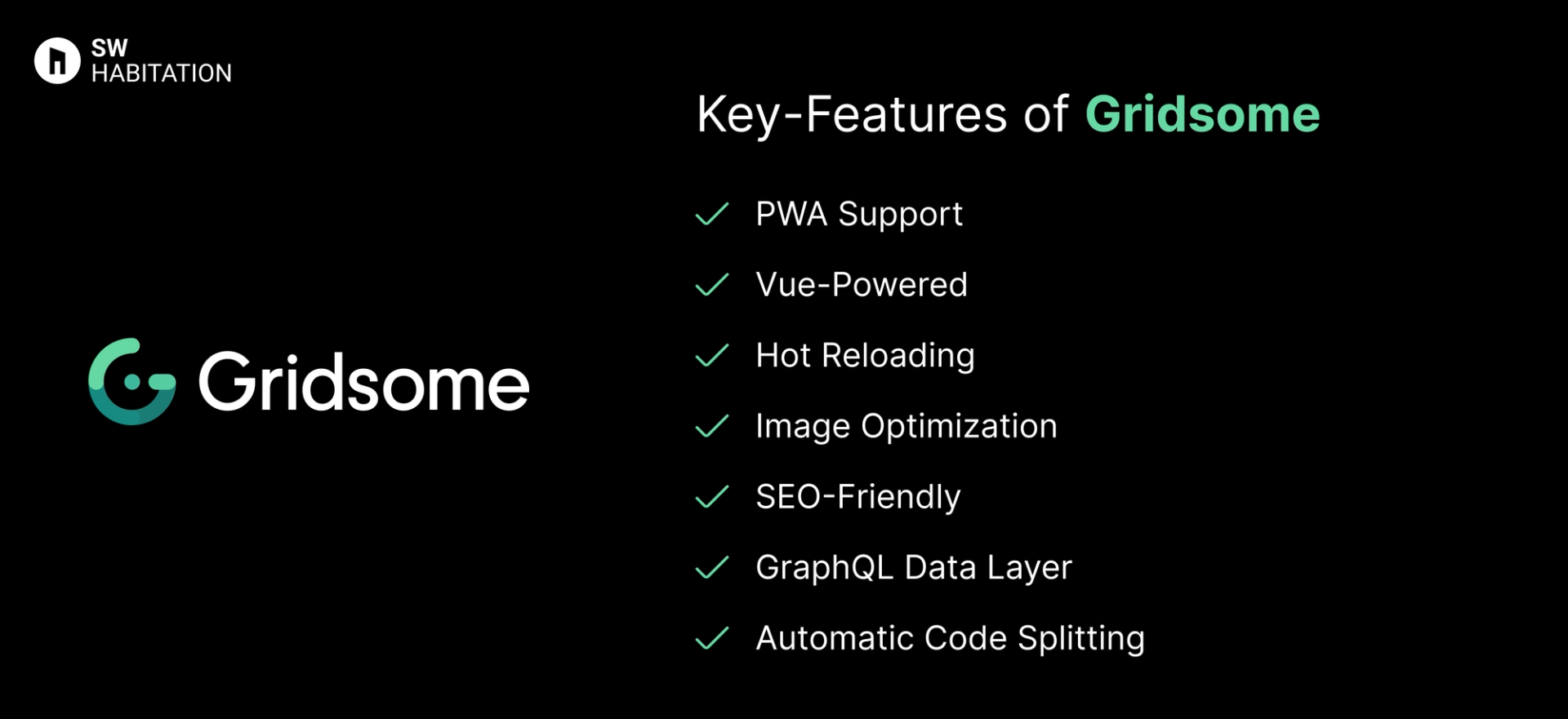Gatsby vs. Gridsome

Gatsby

Gridsome
Have you ever been to a website that loads super fast? Chances are it uses an SSG (Static Site Generator). It’s a tool that builds your site ahead of time, so when someone visits, they get the page instantly. No waiting around for things to load it’s just there.
What is Gatsby?
Gatsby is a React-based static site generator that combines the best of modern web development just like GraphQL, fast performance, and a rich plugin ecosystem to help you build static websites that feel dynamic.
It pulls in data from almost any source (APIs, CMSs, Markdown files) and serves it as blazing-fast static pages.
Key Features of Gatsby


- Optimized Performance: Automatically optimizes images and code splitting.
- Rich Plugin Ecosystem: Extend functionality effortlessly with plugins.
- SEO-Friendly: Pre-renders pages for great search engine optimization.
- PWA Support: Turn your site into a Progressive Web App with ease.
- GraphQL Data Layer: Fetch data from multiple sources seamlessly.
- Hot Reloading: Instant feedback during development.
- React-Powered: Leverages React for building UI components.
Advantages of Gatsby
- Great for Complex Sites: Handles large datasets and complex content structures well.
- Thriving Ecosystem: Tons of plugins and themes to speed up development.
- Data Agnostic: Pull data from anywhere — headless CMSs, APIs, or Markdown.
- Fast Performance: Optimizes everything out of the box.
- React Integration: Perfect if you’re already familiar with React.
Disadvantages of Gatsby
- Overkill for Simple Sites: Might be too much if all you need is a basic static site.
- Build Times: Can get slow with very large datasets.
- Learning Curve: Requires knowledge of React and GraphQL.
What is Gridsome?
Gridsome is a Vue.js-based static site generator that pulls data from various sources — like APIs, Markdown, or CMSs — and builds blazing-fast static sites. It handles everything from data fetching to page generation, letting you focus on crafting beautiful UIs with Vue.
Key Features of Gridsome


- PWA Support: Turn your site into a Progressive Web App effortlessly.
- Vue-Powered: Leverages the simplicity and power of Vue.js.
- Hot Reloading: Instant updates during development.
- Image Optimization: Automatically optimizes images for faster loading.
- SEO-Friendly: Pre-renders pages and offers meta tag management.
- GraphQL Data Layer: Fetch data from any source and use GraphQL to query it.
- Automatic Code Splitting: Loads only what’s needed for each page.
Advantages of Gridsome
- Image Optimization: Automatically optimizes images for faster loading.
- SEO-Friendly: Pre-renders pages and offers meta tag management.
- Vue-Powered: Leverages the simplicity and power of Vue.js.
- Hot Reloading: Instant updates during development.
- GraphQL Data Layer: Fetch data from any source and use GraphQL to query it.
- PWA Support: Turn your site into a Progressive Web App effortlessly.
- Automatic Code Splitting: Loads only what’s needed for each page.
Disadvantages of Gridsome
- Less Community Support: Smaller community compared to Gatsby or Next.js.
- GraphQL Requirement: Requires some GraphQL knowledge.
- Vue-Only: Not ideal if you’re unfamiliar with Vue.js.
Comparison Between Gatsby vs Gridsome
Use Cases of Gatsby
- Large Data-Driven Sites: Great at handling large datasets from APIs or CMSs.
- SEO-Optimized Sites: Pre-renders pages for better SEO performance.
- E-Commerce: Integrates seamlessly with Shopify, Stripe, and other tools.
- Progressive Web Apps (PWAs): Built-in support for PWAs.
- Content-Driven Sites: Blogs, portfolios, documentation sites.
Use Cases of Gridsome
- Vue Enthusiasts: If you already know Vue, Gridsome is a natural fit.
- Fast and SEO-Optimized Sites: Automatic pre-rendering makes SEO a breeze.
- API-Driven Projects: Works great with headless CMSs, APIs, and data-heavy projects.
- Content-Driven Sites: Blogs, portfolios, documentation sites.
Other Resources
Conclusion
Static Site Generators are a big game changer if you’re looking to build a website that’s fast, secure, and easy to maintain. Whether you’re launching a personal blog, portfolio, or a business website, they give you the freedom to focus on what really matters, your content and your users without all the extra complexity.
The best part? You’re not locked into one way of doing things. You can choose the tools and tech you’re most comfortable with, and scale things up as your site grows. From lightning-fast load times to better SEO and easy hosting, SSGs make the whole process smoother.
At the end of the day, it comes down to what fits your workflow and goals best. Pick the one that feels right to your requirements, and you’ll be well on your way to creating a beautiful, high-performing website that you’re proud of 🙌
Frequently asked questions
Is Gatsby SEO-friendly?
Yes, Gatsby provides out-of-the-box features like optimized images, clean URLs, and fast load times—all essential for SEO performance.
Is Gatsby hard to set up?
Not at all, Gatsby has nice documentation and many starter templates, making it easy to get started, even if you’re new to React.
Can I use GraphQL with Gatsby?
Yes, Gatsby has a built-in GraphQL layer, allowing you to query and manage your content and data in a flexible way.
Does Gatsby use React?
Yes, Gatsby is built on React, with the added benefit of GraphQL to pull in data from various sources CMSs, APIs, files, etc.
Is Gridsome based on Vue?
Yup, Gridsome is built on Vue.js, and it allows you to use Vue components within your static site.
Does Gridsome support GraphQL?
Yup, Gridsome uses GraphQL to query and manage content from multiple data sources like APIs, markdown files, and headless CMSs.
Does Gridsome have a free plan?
Yup, Gridsome is open-source, and you can use it for free with no restrictions on your site’s size or content.
Is Gridsome good for large sites?
Yup, Gridsome is highly scalable and designed to handle large amounts of content with excellent performance.
